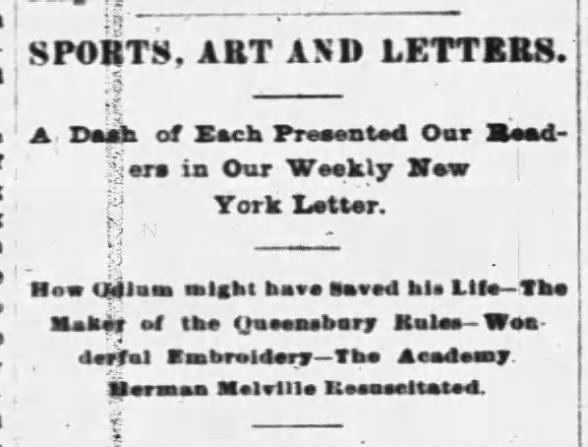In the mid 1880's Walter Langdon Russ (1852-1930) aka "Macswell" was a New York correspondent of the Buffalo Courier. After the New York Tribune printed Melville's poem "The Admiral of the White" out of the blue, "Macswell" remarked on the weirdness of "Herman Melville Resuscitated" in the weekly New York letter dated May 21st and printed in the Buffalo Courier on Monday, May 25, 1885.
Macswell is identified as journalist W. L. Russ in Fact, Fancy, and Fable, ed. Henry Frederic Reddall (Chicago, 1892). Another correspondent of the Courier around this time was Daniel Connelly aka "Rapidan," so identified in Initials and Pseudonyms: A Dictionary of Literary Disguises, ed. William Cushing (New York, 1885). There W. L. Russ is listed under two pseudonyms, "Macswell" (page 181) and "Persimmons" (page 228).
Without further explanation, Macswell credits Charles Allen Thorndike Rice, "ingenious editor of the North American Review," with the "resuscitation" of Melville. The calculation of Melville's age (then nearing 66) is obviously off, unless by "sixty years old" Macswell meant in his sixties.
 25 May 1885, Mon Buffalo Courier (Buffalo, New York) Newspapers.com
25 May 1885, Mon Buffalo Courier (Buffalo, New York) Newspapers.comSPORTS, ART AND LETTERS.
A Dash of Each Presented Our Readers in Our Weekly
New York Letter.
How Odium might have saved his Life--The Maker of the Queensbury Rules--Wonderful Embroidery--The Academy. Herman Melville Resuscitated.
From Our Own Correspondent.
... A poem entitled "The Admiral of the White" was printed in one of our morning papers last Sunday and was printed at the same time, I believe, in other papers, east and west. The author of this poem was Herman Melville, who, as an American author, has been lost to sight for many years. The re-appearance of Melville in literature is, one might say, a curious freak of destiny. There is no special reason why he should re-appear, and everyone had come to the conclusion that he had given up serious authorship. If I am not mistaken, he was eulogized at one period as a man of vigorous talent. But he drifted away from the work he had set himself to do, and, since the civil war, he had been a drudge in some office down town. His first volume of verse, published in 1866, was called "Battle Pieces." Some of the verses in that volume were spirited, though most of them were not better than respectable. "The Victor of Antietam," for example, which has been praised with enthusiasm, seems a cold and dull thing. "Sheridan at Cedar Creek" is more genuine, to say the best of it.
MELVILLE was born in 1819. He is at present, therefore, sixty years old. Mr. Thorndyke Rice, the ingenious editor of the North American Review, is, I am told, responsible for his resuscitation.
... MACSWELL. -- Buffalo Courier, May 25, 1885.
A compressed version of "The Admiral of the White," expanded and retitled The Haglets in John Marr and Other Sailors (1888), had appeared on page 9 of the Sunday New York Tribune, May 17, 1885.
New-York tribune. [volume] (New York [N.Y.]), 17 May 1885. Chronicling America: Historic American Newspapers. Library of Congress. <https://chroniclingamerica.loc.gov/lccn/sn83030214/1885-05-17/ed-1/seq-9/>
Related posts:
- Syndicated in Cincinnati and beyond
https://melvilliana.blogspot.com/2024/01/syndicated-in-cincinnati-and-beyond.html
- More on Thorndike Rice and his 1885 newspaper syndicate
https://melvilliana.blogspot.com/2024/01/more-on-thorndike-rice-and-his-1885.html
- 1885 check endorsed by Herman Melville for deposit
https://melvilliana.blogspot.com/2024/02/1885-check-endorsed-by-herman-melville.html
- Abridged Admiral of the White in St Paul Pioneer Press
https://melvilliana.blogspot.com/2024/02/abridged-admiral-of-white-in-st-paul.html


No comments:
Post a Comment